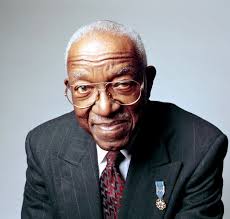John Hope Franklin (1915 – 2009) came within a day of witnessing the 1921 Race Riot. As he, his mother and sister headed to Tulsa to join his father, B.C. Franklin, the family received a telegram saying not to come. There’s been a race riot. Molly Franklin finally heard that Buck Franklin was safe and helping his clients seek reimbursement for their losses. John Hope, with Molly and his sister, waited four and a half more years before the family was reunited, while his father sued the City of Tulsa for passing an ordinance that effectively barred blacks from rebuilding. Buck Franklin won that suit before the Oklahoma Supreme Court.
His father’s success – and his critical importance to the Greenwood community – became a preamble to the success and importance of the son. Dr. John Hope Franklin became one of the most important American historians of the 20th Century.
As a historian, a scholarly voice working for American civil rights, an advisor to presidents and recipient of national and international awards, Dr. Franklin played a unique role in American society.
A brief summary of his accomplishments:
- 1931 Valedictorian of Tulsa’s Booker T. Washington High School; Fisk University, B.A. magna cum laude (1935); Harvard University, M.A., Ph.D. (1941)
- Professor of history at St. Augustine’s College, Raleigh, N.C.; North Carolina College, Durham; Howard University, Washington, D.C.; Brooklyn College, Brooklyn N.Y., chair of History Dept.; University of Chicago, John Matthews Manley Professorship (chair of History Dept.), Chicago, Ill.; Duke University, James B. Duke Professor of History, Durham, N.C.
- Special teaching and research assignments at Harvard University, Brown University, Cornell University, distinguished American lecturer in Australia, the Pitt Professorship of American History and Institutions at Cambridge University, and in numerous countries in Europe, Africa, South America and Asia; Mellon Senior Fellowship at the National Humanities Center
- Author, co-author or editor of many publications including, among others, From Slavery to Freedom, Reconstruction After the Civil War, Problems in American History, ed., An Illustrated History of Black Americans, Runaway Slaves: Rebels on the Plantation, Racial Equality in America, George Washington Williams: A Biography, Race and History, Mirror to America
- President of the American Historical Association, the Southern Historical Association, the Organization of American Historians, the American Studies Association and the United Chapters of Phi Beta Kappa.
- Public service as lead historian for the NAACP Legal Defense Fund in preparing the historical interpretation for Brown v. Board of Education; member of the Fulbright Board; chair of the Advisory Board of President Clinton’s Initiative on Race
- Presidential Medal of Freedom, 1995; Oklahoma Treasure,
- Orchid aficionado and developer, namesake of Phalaenopsis John Hope Franklin
This outstanding scholar devoted his life to understanding our American past (research) and preparing generations to become “law-abiding, hard-working, highly respected, and self-respecting loyal citizens” (teaching).

